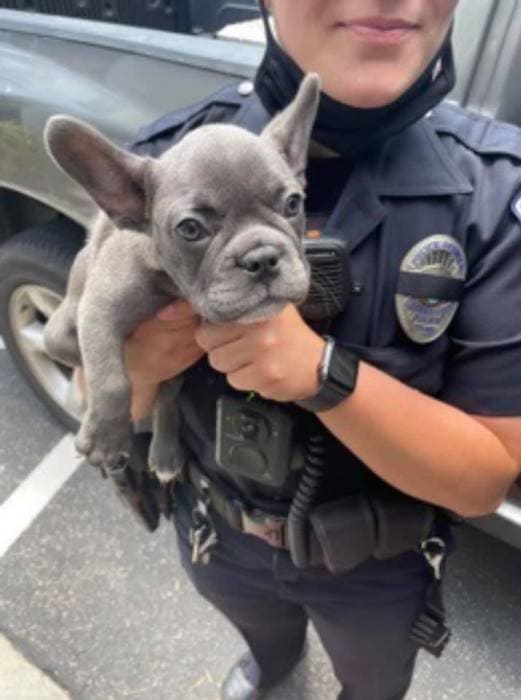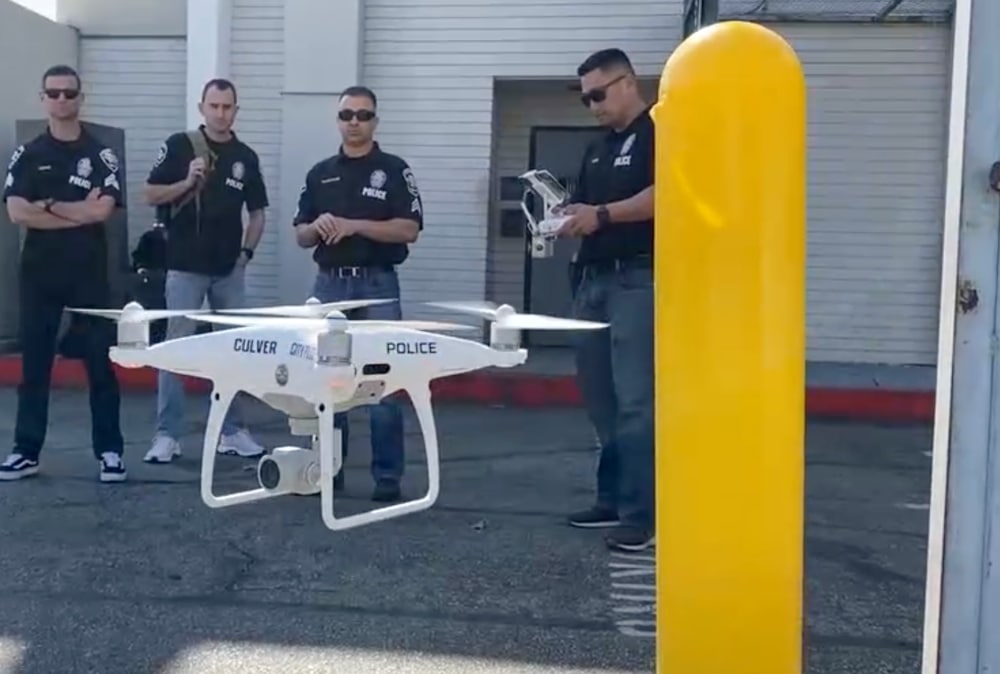Drone Helps Police Nab Man Who Stole French Bulldog Puppy at Gunpoint
BY Zacc Dukowitz
19 May 2021Police in Culver City, California recently used a drone to help apprehend a man who stole a puppy at gunpoint.

Image source: Culver City Police Department
The man was responding to an ad he’d seen on Craigslist about a grey, 10-month old French Bulldog. When the owner showed the man the puppy he took out a semi-automatic handgun, grabbed it, and ran.
Detectives quickly narrowed their list of suspects down to one person, and Culver City detectives began surveilling his home.
Four days later, the detectives saw the man leave his home holding a puppy that matched the description of the stolen one and getting into a car. When they tried to pull the man over shortly after he started driving he drove off, and they pursued him.

A picture of the recovered puppy
The chase only lasted a few minutes, until the man, driving erratically, crashed into another car then got out and started running on foot. (Police later reported that the person he hit wasn’t injured in the collision.)
And that’s when the police got out their drone.
After the man fled on foot, the Culver City Police Drone Team quickly arrived on the scene and put their DJI Phantom 4 Pro in the air to help conduct a perimeter search. In addition to the drone, detectives also used other undisclosed surveillance techniques to look for the man.
The man was ultimately found and arrested for armed robbery three hours after the detectives first saw the man leaving his home with the puppy. The puppy was recovered unharmed and reunited with its owners.
View this post on Instagram
Why Are People Stealing French Bulldogs?
French Bulldog thefts have been on the rise lately.
In February, two men jumped out of a white sedan around 9:40 at night and demanded that Ryan Fischer—Lady Gaga’s dog walker—give them the three French Bulldogs he was walking.
He refused, a struggle ensued, and one of the men shot Fischer once in the chest. After shooting him the men fled with two of the three dogs. (Fischer survived the shooting and is now in good health.)
The struggle was captured on a security camera from a nearby home. Investigators think the theft wasn’t targeted at Lady Gaga specifically but instead may have been a crime of opportunity—the men saw the dogs as they drove by and stopped to steal them.
And the Lady Gaga theft wasn’t the only French Bulldog story in the news since the start of this year.
The month before the Lady Gaga theft, a woman in San Francisco was attacked and held at gunpoint while walking her French Bulldog. And in March, a family had their French Bulldog stolen at gunpoint outside of a Target in North Hollywood.
In each case huge rewards were offered for the return of the dogs. The woman in San Francisco offered $8,000, the North Hollywood family offered $12,000, and Lady Gaga offered $50,000.
While Lady Gaga’s dogs were returned within a week, the dogs owned by the San Francisco woman and the North Hollywood family were never recovered.
So why is this happening?
Because of money.
French Bulldogs are small, making them easy for a thief to grab, and they’re worth a lot. A French Bulldog can reportedly sell for anywhere from $1,500 to $5,000 or more.
Can Police Use Drones for Surveillance?
A concern commonly voiced when police departments announce plans to launch a drone program is that the drones will be used to surveil citizens.

Image source: Culver City Police Department
Though spying by drone is a common fear, the reality is that law enforcement uses drones for a lot of other things. To make this concrete, here is a list of all the ways the Culver City Police Drone Team uses drones in its work:*
- Barricaded Suspects
- Active Shooter Mass Casualty Incidents
- Hostage Situations
- Crime Scene Investigations
- Search & Rescue Operations
- Fires
- Disaster Management
- Critical Missing Persons Investigations
- CBRNE Incident (chemical, biological, radiological, nuclear, and explosive)
Supporting Search and Arrest Warrant Operations - Perimeter Searches and Security for Armed and/or Felony Suspects
- Routine Training (public places)
*This list also includes use cases for the city’s fire department
As you can see, the aerial surveillance conducted in the French Bulldog theft falls under Perimeter Searches (the second-to-last item in the list).
That wording is intentional.
The Culver City Police Department knows that the word “surveillance” is an immediate no-go for citizens, and is careful to avoid it. The department goes even further in distancing itself from the word in an explainer video on its website, saying that it will never conduct surveillance by drone.
This is about more than semantics. While you could say the Phantom 4 was surveilling an area during the chase described above, it wasn’t being used for a general fishing expedition to see what might be going on in a given neighborhood—it was looking for a specific person in a specific area during a specific window of time.
Using drones for this kind of surveillance makes a lot of sense and is likely to continue for a long time. But there is another kind of aerial surveillance that police may soon be banned from conducting, which is using drones to surveil private property without a warrant.
A recent court case in Long Lake Township, Michigan hinged on visual data local police had collected by drone to prove that a couple was running an illegal salvage business. The couple claimed that using the drone represented a violation of their privacy, and the case was found in their favor.
Specifically, the court ruling reads that drones are a unique kind of aircraft, and “this difference directly impacts a landowner’s reasonable expectation of privacy.”
The precedent set by that ruling could mean not only that law enforcement can’t use drones to surveil private property without a warrant, but that no one can fly over private property without permission, commercial drone pilots included.
It’s still too early to know whether this will happen, but the door seems to have been opened from a legal perspective to make this argument. But as more drone privacy cases are brought to court it will be interesting to see how the Michigan verdict is used, and whether it serves to limit not only police uses for drones, but everyones.
Know of other inspiring instances of law enforcement using drones in their work? Share what you know in this thread on the UAV Coach community forum.


